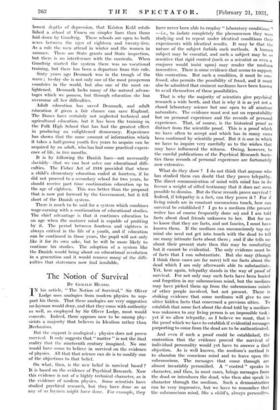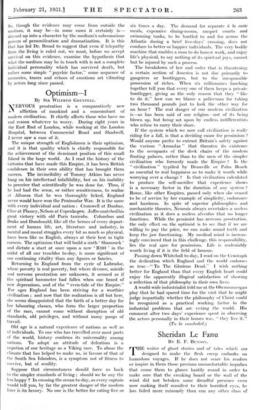The Notion of Survival
BY GERALD HEARD.
IN his article, " The Notion of Survival," Sir Oliver Lodge uses analogies from modern physics to sup= port his thesis. That these analogies are very suggestive no layman would deny, and that. they come with authority as well, as employed by Sir Oliver Lodge, most would concede. Indeed, there appears now to be among phy- sicists a majority that believes in Idealism rather than Mechanism.
But the support is analogical ; physics does not prove survival. It only suggests that " matter " is not the final reality that the nineteenth century imagined.. No one would have come to believe in survival on the evidence of physics. All that that science can do is to modify one of the objections to that belief.
On what, then, is the new belief in survival based ? It is based on the evidence of Psychical Research. Now this evidence is not of a highly technical character, as is the evidence of modern physics. Some scientists have studied psychical research, but they have done so as any of us laymen might have done.- For example, they have never been able to employ " laboratory conditions —i.e., to isolate completely the phenomenon they were studying and to repeat under identical conditions their experiments with identical results. It may be that the nature of the subject forbids such methods. A human subject may be essential, and such a subject may be so sensitive that rigid control (such as a scientist or even a, conjurer would insist upon) may render the medium insensitive. There is some evidence that seems to support this contention. But such a condition, it must be con- fessed, also permits the possibility of fraud, and it must also be admitted that eminent mediums have been known to avail themselves of these possibilities.
That is why the majority of scientists give psychical research a wide berth, and that is why it is as yet not a closed laboratory science but one open to all amateur naturalists. The evidence must rest not on repeatability but on personal experience and the records of personal experience. That, of course, is the historical proof as distinct from the scientific proof. This is a proof which we have often to accept and which has in many cases been confirmed by scientific proof. But it is one in which we have to inquire very carefully as to the wishes that may have influenced the witness. Owing, however, to the careful publications of the Psychical Research Socie- ties these records of personal experience are fortunately now extensive.
What do they show ? I do not think that anyone who has studied them can doubt that they prove telepathy. The direct communication of mind with mind has in its favour a weight of sifted testimony that it does not seem possible to dismiss. But do these records prove survival ? Indeed, if telepathy is a fact, can they prove it ? For if living minds are in constant unconscious touch, how can survival be established ? I go to a medium (the present writer has of course frequently done so) and I am told facts about dead friends unknown to her. But for me to know that they are facts, and not fancies,. I must have known them. If the medium can unconsciously tap my mind she need not get into touch with the dead to tell me many intimate facts about them ; and if she tells me about their present state then this may be comforting but it cannot be evidential. The only evidence must be of facts that I can substantiate. But she may (though I think these cases are far rarer) tell me facts about the dead which I am only afterwards able to substantiate. Yet, here again, telepathy stands in the way of proof of survival. For not only may such facts have been buried and forgotten in my subconscious mind, but the medium may have picked them up from the subconscious minds of other people involved, but not present. • There is striking evidence that some mediums will give to one sitter hidden facts that concerned a previous sitter. To establish that some fact about the dead told by a medium was unknown to any living person is an impossible task : yet if we allow telepathy, as I believe we must, that is the proof which we have to establish if evidential messages purporting to come from the dead are to be authenticated.
And even if such a proof could be established, the contention that the evidence- proved the survival of individual personality would yet have to answer a final objection. As is well known, the -medium's method is to abandon the conscious mind and to leave open the subconscious. The messages that come through arc almost invariably personified. A " control " speaks in character, and then, in most cases, brings messages from the dead or introduces the dead, who then also speak in character through the medium. Such a demonstration can be very impressive, but we have to remember that the subconscious mind, like a child's, always personifies. So, though the evidence may come from outside the medium, it may be—in some cases it certainly is— dressed up into a character by the medium's subconscious powers of personification and .dramatization. It is this that has led Dr. Broad to suggest that even if telepathy from the living is ruled out, we must, before we accept survival on this evidence, examine the hypothesis that what the medium may be in touch with is not a complete individual personality which has survived death, but rather some simple " psychic factor," some sequence of memories, traces and echoes of emotions set vibrating by actors long since passed.












































 Previous page
Previous page